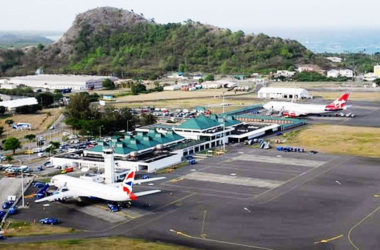
JUST as rain doesn’t fall on only one roof and Climate Change affects Planet Earth across national and regional borders without boundaries either way, the dual effects are also common across all Caribbean nations and dependent territories, bar none.
Geography places all Caribbean nations and dependent territories like peas in the same pod, or fruits in the same bowl, thus opening the ways for uniting around fruitful solutions to their common problems, of which Climate Change and Water are only two, alongside Food Insecurity.
But history has also taught that in the Caribbean, nationalism always trumps regionalism and global goals always get a back seat in national political priorities.
So, while the crises continue, all sorts of solutions are being suggested and new mechanisms are being developed, but most don’t spell well for addressing new and old Caribbean challenges.
The challenges are the same in North and South, only becoming increasingly urgent everywhere.
For example, according to a recent Reuters report, Swedish activist Greta Thornburg warns that Humanity is “rushing towards the cliff” of climate catastrophe…”, while a new study by think-tank Climate Analytics concludes this “can only be averted by ramping-up wind and solar energy installations five times faster” and cutting fossil fuels production 6% annually by 2030.
But at a time when tighter and better regulation is considered more necessary now than ever, EU antitrust regulators have also just scrapped a year-long investigation into several companies that build networks and treatment plants for drinking water and waste water, for “lack of evidence…”
And Toyota shareholders have also just rejected a resolution urging greater disclosure of the mega global car manufacturer’s climate lobbying.
On the other hand, national interest decisions in the South continue to be overruled and challenged with threats of sanctions by rich nations pressing harder on developing countries to tighten regulation, resulting in an Indonesia Cabinet minister recently accusing the European Union (EU) of conducting “regulatory imperialism” with its new deforestation law, while they talk on a free trade deal.
But there’s also some good news from Australia that regulation can yield resources for investment in better delivery of products and services, as Queensland – its third largest state — just revealed that its revenue from fossil-fuel royalties is likely to have almost tripled over the past 12 months to A$15.3 billion (US $10.4 billion).
Meanwhile, according to the same Reuters report, “Climate Change’s effects on urban life in developed nations have led to extraordinary levels of adaptation towards strengthening resilience.”
Lindsay Brugger, head of Urban Resilience at the Urban Land Institute (a global non-profit entity) explains the imperative to protect cities from climate disaster, saying: “In 2022 alone, extreme weather events cost the United States $175.2 billion in damage. Taking action to make our cities more resilient to climate change effects – also known as urban resilience – clearly cannot wait.”
She said the Urban Land Institute just wrapped-up its fourth annual Resilience Summit (that gathers multidisciplinary experts to explore practical solutions for climate risk mitigation) in Canada and one key takeaway is that “community engagement is critical to reducing climate risk – and local stakeholders are already taking an active role in improving their community’s resilience.”
She cited as another Canadian example, “the precedent-setting Indigenous-led plans by the Squamish Nation for 6,000 net-zero residential units covered in greenery, to reduce heat and stormwater impacts, coming to Vancouver – an initiative that tackles Canada’s housing crisis, climate hazards, and carbon emissions challenges, simultaneously.”
On another hand, Vietnam is battling electricity cuts caused by a heatwave that has exposed structural and bureaucratic problems, limiting available power to half of installed capacity and crimping efforts to unlock $15.5 billion in global climate funding.
However, such examples are both distant and different to the Caribbean, where (like elsewhere) approaches to common problems are not always collective or in unison, whether in relation to Climate Change adaptation or addressing water woes.
Indeed, the news just isn’t good for developing nations pursuing long-overdue and outstanding Northern promises of debt relief, assistance in environmental and climate adaptation and payment of climate debt.
The richest nations are grappling with their own post-COVID and Ukraine war political, economic, military, social and other accumulating crises — and as the chickens come home to roost, G-7 language is changing quite rapidly.
In the UK, Thames Water — which provides the liquid of life to 25% of British households — is facing its worst crises since privatization in the 1970s, with the monopoly water company now in over US $4 billion debt, representing 80% of its value.
The company has since 1989 always insisted on paying higher dividends and spending less on investments in production and efficiency; and now citizens are complaining about the increases in regularity of sewage spills and waste water leaks, as a company that’s supposed to be a money-maker from water is quickly sinking from rising debt, while services decline.
The discussion now is on whether the UK government should now ‘nationalize’ Thames Water – meaning transferring its problems to an economy that’s already the weakest in Europe and taking the longest to recover from ongoing inflation and recession blues worsened by interest rates rising higher and faster than ever.
G-7 nations – the richest on the planet — are further tightening their purse strings for international aid, even while continuing to seek maintaining global dominance in everything from trade to defense expenditure but serious lessons learned long ago are biting harder now, leading to actions and admissions that reverse earlier policies.
In the UK, for example, Brexit Blues has been forcing many policy reversals, including reopening the UK market to cheaper labour from neighboring European or poor developing nations.
And in the USA, President Joe Biden said just this week that “The trickle-down approach has failed the middle class” and “increased their debts” — and now it’s time to “grow the economy from the bottom up…”













